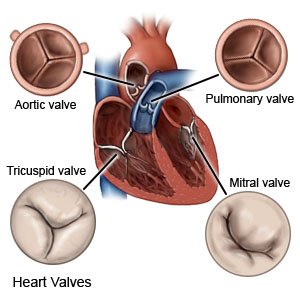Tricuspid Valve Clip Repair
Medically reviewed by Drugs.com. Last updated on Aug 4, 2025.
What do I need to know about tricuspid valve clip repair (TVCR)?
TVCR is a procedure to repair the tricuspid valve and decrease leakage. This procedure is also called edge-to-edge repair.
 |
How do I prepare for TVCR?
- Your healthcare provider will tell you how to prepare. You may be told not to eat or drink anything after midnight on the day of your procedure. Arrange to have someone drive you home when you are discharged.
- Tell your provider about all medicines you currently take. Your provider will tell you if you need to stop any medicine for the procedure, and when to stop. Your provider will tell you which medicines to take or not take on the day of your procedure.
- Tell your provider about any allergies you have, including to anesthesia or medicines. You may be given an antibiotic to help prevent a bacterial infection.
- You may need an echocardiogram (echo), EKG, or CT before your procedure. These tests will help your provider plan for your repair. Your provider may also use an echo during the procedure to check the valve and valve leaflets. Leaflets are flaps of tissue that should prevent blood from flowing backward through the valve.
Related medications
What will happen during TVCR?
- You will be given general anesthesia to keep you asleep and free from pain during the procedure. Your provider will insert a catheter into a vein in your groin. The catheter will be guided to your heart. Your provider will repair your valve through the catheter.
- The catheter will be used to place a clip device to hold the leaflets close together. This helps decrease leakage. Your provider will check the blood flow through your valve. When the valve is working properly, your provider will remove the catheter. The catheter site will be closed with stitches and covered with a bandage.
What should I expect after TVCR?
- You will be taken to a recovery room until you are fully awake. Healthcare providers will monitor you closely for any problems. You may need to stay in the hospital overnight, depending on your condition.
- You may need to lie flat for a few hours after your procedure to protect the catheter site. Talk to healthcare providers before you get up the first time. They may need to help you stand up safely.
What are the risks of TVCR?
You may bleed more than expected or develop an infection. Parts of your heart may be damaged during the procedure. Your repaired valve may stop working. The clip device may move out of place. The clip may not work properly, or it may stop working properly later. You may need another procedure or surgery to fix these problems. Your symptoms may return. You may develop heart failure. You may develop a blood clot or an irregular heartbeat. These can be life-threatening.
Care Agreement
You have the right to help plan your care. Learn about your health condition and how it may be treated. Discuss treatment options with your healthcare providers to decide what care you want to receive. You always have the right to refuse treatment. The above information is an educational aid only. It is not intended as medical advice for individual conditions or treatments. Talk to your doctor, nurse or pharmacist before following any medical regimen to see if it is safe and effective for you.© Copyright Merative 2025 Information is for End User's use only and may not be sold, redistributed or otherwise used for commercial purposes.
Further information
Always consult your healthcare provider to ensure the information displayed on this page applies to your personal circumstances.
